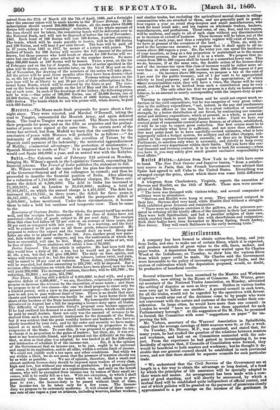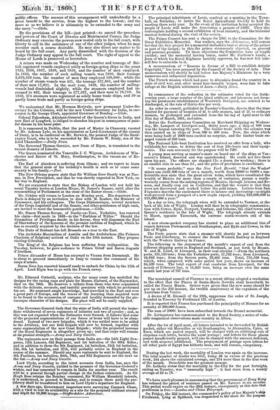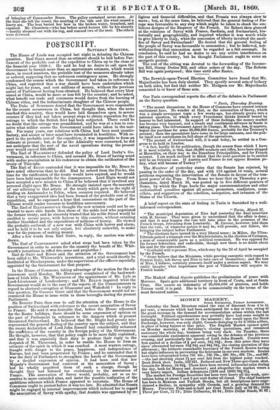Ziorttlanmo.
A company has been formed to obtain cotton-flax, hemp, and jute from India, and also to make use of certain fibres which it is expected, will produce materials of great value to the silk linen, mohair, and paper trades. A deputation from the company waited upon Sir Charles Wood at the Indiahonse' on Tuesday, to show him the various fibres from which paper could be made. Sir Charles said the Government were favourable to the policy of increasing the exports of India, and the system of cultivation which the deputation proposed, would, no doubt, be productive of beneficial results.
Several witnesses have been examined by the Masters and Workmen Committee now sitting in the House of Commons. Mr. Winter, gene- ral secretary of the National Trades Association, on Monday, advocated the settling of disputes as soon as they arose. Strikes in various trades were very apt to follow one another. A general council in each town, for all the trades, would not be regarded by the operatives with favour. Disputes would arise out of the decisions come to by people who were not conversant with the nature and customs of the trade under their con- sideration. In large cities, he would have more than one council : in London he would have no objection to see them appointed for each Parliamentary borough." At the suggestion of Sir M. Pete, he promised to furnish the Committee with some suggestions on paper" for im- proving the bill. Mr. Vickers, secretary of the Weavers' Association in Spitalfields, stated that the average earnings of 8000 weavers were 98. or 108. a week.
On Tuesday, Mr. Blaney, M.P., was examined, and stated that, for many years, he had studied the question of the relations between masters and workmen, and had sat on Committees connected with the sub- ject. From the experience he had gained in investigating it, he was decidedly of opinion that, if Councils of Conciliation were formed, they would be beneficial to both masters and workmen; but he thought it de- sirable that one general council should be established in each provincial town, and not that there should be separate councils for each particular
trade.
"We understand that the Civil Service of the Government are at length in a fair way to obtain the advantage so long desired, of a fund by which the principles of life assurance will be specially adapted to their wants and means. An arrangement has been made with a com- pany of good standing, and will shortly be announced, by which a mutual fund will be established quite independent of official control, and out of which policies will be granted on the payment of premiums closely approximated to a per centage on the incomes of the gentlemen in
public offices. The success of this arrangement will undoubtedly be a great benefit to the service, from the highest to the lowest ; and the more so as we believe it is ultimately to be extended to the army and the navy."—Globe.
By the provisions of the bill—just printed—to amend the procedure and powers of the Court of Divorce and Matrimonial Causes, the Judge Ordinary may exercise the powers now vested only in the full court, with liberty to call in the assistance of one of the other judges, when he may eonsider such a course desirable. He may also direct any matter to be
• heard by the full court. Any party dissatisfied with the decision of the Judge Ordinary may appeal to the full court. The right of appeal to the House of Lords is preserved as heretofore.
A return was made on Wednesday of the number and tonnage of Bri- tish registered vessels employed solely as foreign-going ships in the years 1855, 1856, 1857, 1858, and 1859, and the number of men employed. In 1858, the number of such sailing vessels was 7999, their tonnage 3,029,226 tons, the number of men they employed 109,090; while the number of steam-vessels was 421, the tonnage 257,861, and the number of their men 17,821. In the next year, 1859, the number of sailing- vessels had diminished slightly, while the steamers employed had in- creased to 462, their tonnage to 277,527, and their men to 18,719. In 1859, 374 steamers were registered as solely home trade ships, and 59 as partly home trade and partly as foreign-going ships.
We understand that Mr. Herman Merivale, now permanent Under-Se- cretary for the Colonies, will be the new Under-Secretary for India, in suc- cession to Sir George Clerk, appointed Governor of Bombay.—Globe.
Colonel Pakenham, Adjutant-General of the Queen's forces in India, and now Earl of Longford, is obliged to abandon his post in consequence of pain- ful disease in his knee-joint.
It is rumoured in Dublin, that the post of Master in Chancery, vacated by Mr. Acheson Lyle, on his appointment as Lord-Lieutenant of the county of Derry, is to be conferred on Mr. Berwick, the present Judge of the Bank- ruptcy Court, who is to be succeeded by Mr. Francis W. Brady, son of the Lord Chancellor.—Daily News.
The Reverend Thomas Gamier, now Dean of Ripon, is translated to the vacant deanery of Lincoln.
The Queen nominated the Venerable J. C. Wig,ram, Archdeacon of Win- chester and Rector of St. Mary, Southampton, to the vacant see of Ro- chester.
The Earl of Aberdeen is suffering from illness ; and we regret to learn that the general state of his lordship's health is such as to came some anxiety to his family.—Past.
The New Orleans papers state that Sir William Gore Onsely was at Nas- sau, in New Providence, and that he was shortly expected in New York, on his way to England.
We are requested to state that the Bishop of London will not hold his usual Tuesday levees at London House, St. James's Square, until after the reassembling of Parliament at the close of the Easter recess.—Globe.
Mr. Cobden will return to London on Monday next. His departure from Paris is delayed by an invitation to dine with M. Rouher, the Minister of Commerce, and his colleagues. The Corps Diplomatique, several members of the Corps Legislatif and of the Senate, and other gentlemen of high rank, are invited to meet the honourable gentleman.—Globe.
Mr. Simon Thomas Scrope, of Danby-on-Yore, Yorkshire, has renewed his claim—first made in 1858—to the "Earldom of Wines." Should the Committee of Privileges decide in his favour, they will dispossess the Earl of Shrewsbury of the honours of the premier earldom of England, which he has so recently acquired by the decision of the law.
The Duke of Brabant has left Brussels on a tour to the East.
The Archduke Maximilian of Ana& iat and the Archduchess (the Princess Charlotte of Belgium) arrived at Cadiz on the 16th instant. They propose visiting Gibraltar.
The Xing of the Belgians has been suffering from indisposition. On Tuesday, however, he gave audience to Prince Orloff and Baron Augusta d'Anethan.
Prince Alexander of Hesse has returned to Vienna from Darmstadt. He is about to proceed immediately to Italy to resume the command of his corps d'armee.
Baron Gros has reported himself ready to embark for China by the 12th of April. Lord Elgin was to go with the French envoy.
Mr. Edmund Cotterill, sculptor, who for many years has modelled the designs for the racing cups and plate for Messrs. Garrard, of the Haymarket, died on the 24th. He deserves a tribute from those who were acquainted with the delicate, accurate, and tasteful precision with which he performed his art. He possessed ample knowledge, had travelled in the East and over a great part of Europe, and the traces of the learning thus acquired were to be found in the accessories of costume and locality demanded by the pic- turesque character of his designs. His place will not be easily supplied.
The Governor-General finds that the state of India will permit the imme- diate withdrawal of seven regiments of infantry and two of cavalry; and, as this was not expected when the Estimates were framed, it follows that some of the projected augmentations of our forces at home will have to be aban- doned. Instead of two new brigades, which it was settled were to be added to the Artillery, but one field brigade will now be formed, together with some augmentation of the new Coast Brigade ; while the projected increase of the Royal Engineers is altogether given up ; and that corps will remain at its present strength.—Army and Navy Gazette.
The regiments now on their passage from India are—the 14th Light Dra- goons, 12th Lancers, 53d Regiment, and 1st battalion of the 60th Rifles ; and in addition to these the 8th Regiment, 1st battalion, 24th 1st battalion, 730, 6th 1st battalion, and 37th, will probably arrive in England in the course of the summer. Should any more regiments be sent to England, the 5th Fusiliers, let battalion, 64th, 70th, and 83d Regiments are the next on the list.—Army and Navy Gazette.
Lord Clyde, according to the latest accounts from India, has, says the Artny anti Navy Gazette, yielded to the pressure of the Governor-General's wishes, and has consented to remain in India for another year. The result will be a general though partial change in the Indian commands. As Sir Hugh Rose retains the Bombay command, Sir William Mansfield intends, it is understood, to proceed to Bombay, and to remain there until the pre- sidency shall be transferred to him On Lord Clyde's departure for England.
A few days ago, Government inspectors were surveying Cannock Chase, with a view to test its availability as a site for the proposed midland arsenal and depot for 10,000 troops.—Stafordshire Advertiser.
The principal inhabitants of Leeds, resolved at a meeting in the Town- hall, on Saturday, to invite the Royal Agricultural Society to hold its meeting there next year. In the event of the invitation being accepted the people of Leeds will make the Association a present of 15001. They also contemplate holdings second exhibition of local industry, and the triennial musical festival during the visit of the society.
The Prince Consort has sent a cheque for 250/. to the Committee for the Great Exhibition Memorial. Our readers, says the Athenaunt, will remem her that the first project for a memorial included a bust or statue of the prince as part of the design ;- to this the prince strenuously objected, on general and personal grounds. Tcr these objections the Committee have at length yielded; and the memorial having taken, under Mr. Durham's hands a form of which his Royal Highness heartily approves, he has now felt him- self free to subscribe to it.
A memorandum of "Reasons in favour of a Bill to establish Artistic Copyright," has been prepared by the Council of the Society of Arts. This memorandum will shortly be laid before her Majesty's Ministers by a very numerous and influential deputation.
The French mission which had gone to Abyssinia found the country in a state of civil war, and, after many hair-breadth 'scopes, were fain to take refuge at the English settlement of Aden.—Daily News.
In consequeuee of the reduction in the estimates voted for the forth- coming year, a large number of the hired artificers and labourers not form- ing the permanent establishment of Woolwich Dockyard, are ordered to be discharged, at the rate of thirty-five per week.
An order in council, published in Tuesday's Gazette, directs that the time limited for payment of bounties of 41. to able seamen, and of 2/. to ordinary seamen, be prolonged and extended from the 1st day of April next to the 31st day of March, 1861, inclusive.
Before the Parliamentary Committee on Merchant Shipping on Wednes- day, Mr. Lampert of Liverpool said, thirty years ago, a ship of 800 tons was the largest entering the port. The timber trade with the colonies was then carried on in ships of from 300 to 400 tons. Now, the ships which were being built of 2000 tons excited no surprise, and the timber trade en- gaged vessels of 500 tons.
The National Life-boat Institution has received an offer from a lady, who withholds her name, to defray the cost of four life-boats and their equip- ments. The sum necessary for the purpose will be 7201.
A young man serving as master's-mate on board one of the ships at Van- couver's Island, deserted and was apprehended. He could not live there upon his pay.. The officers are charged 12s. a dozen for washing there is no smaller coin in use than 6d., and the price of provisions is exorbitant.
"It seems probable," says the New York Herald, "that the Washoe mines can yield 500 tons of ore a month, worth from $2000 to $1000 a ton. Scientific men state that the great silver veins, which have constituted the wealth of Mexico for more than a couple of centuries, pursue a north- westerly course from the mining regions of Mexico, through Arizona and So- nora, and finally crop out in California, and that the wonder is that they were not discovered and worked before the gold mines. Letters from San Francisco describe the excitement there as intense and increasing—as might well proceed from a prospect of a new staple export, yielding $20,000,000 to $25,000,000 a year."
In a day or two, the telegraph wires will be extended to Ventnor, at the back of the Isle of Wight. London will then be in telegraphic communica- tion with Cowes, Ryde, Newport, Ventnor, and Osborne, the chief towns and Queen's residence in the Isle of Wight. The telegraph already extends to Hurst, opposite Yarmouth, the extreme south-western end of the island.
A new steam-packet company has started to place an additional line of vessels between Portsmouth and Southampton, and Ryde and Cowes, in the Isle of Wight.
The Poole papers state that a steamer will shortly be put on between Poole and Cherbourg, to connect the South Western Railway in England with the Western Railway in France.
The following is the statement of the month's export of coal from the different shipping ports in England and Scotland, as put forth by Messrs. W. and H. Laird, of Liverpool, in their coal circular :—From the northern ports, 131,125 tons; from the Yorkshire ports, 17,752 tons ; from Liverpool, 48,805 tons ; from the Severn ports, 23,405 tons. Total, 731,538 tons, which, when compared with same period last year, shows an increase of 84,539 tons. The total export of coal coastwise from Liverpool, for the month of February last, is 11,023 tons, being an increase over the same month last year of 707 tons.
The municipal council of Florence in a recent sitting adopted a resolution to the effect that the Piazza di Santa-Maria Novella shall henceforth be called the Piazza Manin. Orders were given that the new name should be put up on the 22d instant, the twelfth anniversary of the expulsion of the Austrians from Venice.
A decree of M. Ricasoli of the 18th, suppresses the order of St. Joseph, founded in Tuscany by Ferdinand HI. of Austria.
It is reported that France has purchased the principality of Monaco for an annuity of 200,000 francs.
The sum of 2000/. have been subscribed towards the Brunel memorial. Dr. Livingstone has communicated to the Royal Societyh series of valu- able magnetical observations made recently in Africa.
After the 1st of April next, all letters intended to be forwarded by British packet, either via. Marseilles or via Southampton to Alexandria, Cairo, or Suez, which are posted unpaid, will be charged with an additionril rate of sixpence each letter, besides the usual postage; and letters for those places posted insufficiently prepaid, will also be charged with the amount deficient, and with sixpence additaonal. The prepayment of postage upon letters for all other parts of Egypt has hitherto been, and will remain, compulsory.
During the last week, the mortality of London was again on the increase. The total number of deaths was 1611, being 48 in excess of the previous week, 244 above the calculated average, and 214 more than in the first week of the month. Bronchitis was the greatest scourge. Dr. Letheby states that the mortality in the City for the past fortnight, ending on Tuesday, was "unusually high": it had risen from a weekly average of 65 to 76. -
We have much pleasure in announcing that the government of Hong Kong has reduced the period of sentence passed on Mr. Tarrant to six months. This period would expire on the 20th instant, consequently at this date that gentleman is free.—London and China Telegraph. On Friday, the 235 instant, the commander's galley of her Majesty's ship Firebrand, lying at Spithead, was despatched to the shore for the purpose
of bringing off Commander Bruce. The galley contained seven men. At the time she left the vessel, the meeting of the tide and the wind caused a heavy sea. The boat buried her bow in the broken water, broached, and capsized. Mr. Chambers--who has before saved human life by his alacrity —hastily steamed out with his tug, and rescued two of the men. The others were drowned.




























 Previous page
Previous page